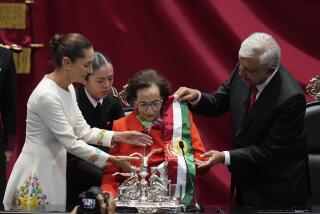Liberian Shines in Her New Role as Africa’s First Elected Female Leader
- Share via
KHARTOUM, Sudan — When South African Foreign Minister Nkosazana Zuma first started attending African leadership summits in 1999, security guards would often block her at the door. “They assumed I was someone’s spouse or secretary,” Zuma recalled.
On Tuesday, there was no mistaking the identity of Ellen Johnson-Sirleaf, the new president of Liberia who made her first appearance at the African Union’s annual summit here.
At a conference largely overshadowed by a bitter fight over who should assume the leadership of the pan-African alliance, the debut of Africa’s first elected female head of state electrified the gathering and injected a few sorely needed moments of unity and celebration.
Wherever she went, the Harvard-educated grandmother received near-rock-star adulation. The media mobbed her. Observers applauded as she passed. Women sang and broke out in traditional African trilling sounds.
“It’s her!” cried one excited delegate as Johnson-Sirleaf arrived at the summit Tuesday morning, sweeping past the crowd in a white dress and green head scarf.
Red-uniformed Sudanese musicians heralded her arrival with a brief anthem outside the Khartoum conference hall. Inside, Johnson-Sirleaf’s appearance brought the summit to a temporary halt.
Applauding female delegates and ministers surrounded the new president and escorted her to her seat as the male heads of state rose in a standing ovation and, curiously, a bagpiper serenaded in the background.
“We were all singing and dancing,” said Hafsa Mossi, senior advisor to Burundi President Pierre Nkurunziza. “It must have gone on for 10 minutes.”
Johnson-Sirleaf’s election has drawn international attention to women’s rights in Africa. First Lady Laura Bush and Secretary of State Condoleezza Rice joined Nigerian President Olusegun Obasanjo and South Africa President Thabo Mbeki at her inauguration this month.
Johnson-Sirleaf beat soccer star George Weah in the race to lead Liberia, which was founded in 1847 by freed American slaves. During a hard-fought runoff campaign, supporters in the West African nation hung banners reading, “Ellen -- She’s Our Man.”
Observers predict her election will inspire a younger generation of African girls and clear the path for other rising female politicians on the continent.
“A female voice at this level is quite uncommon,” said Jakkie Cilliers, director of the Institute for Security Studies, a South African-based research group.
Despite an old-boys network that has historically dominated African politics, women are making inroads. In 2004, Kenyan environmentalist Wangari Muta Maathai won the Nobel Peace Prize. Nigerian Finance Minister Ngozi Okonjo-Iweala has garnered international praise for her anti-corruption campaign. Mozambique Prime Minister Luisa Dias Diogo is considered a front-runner for her nation’s next presidential race.
“It’s really a good time for women leadership across the continent,” said Assistant U.S. Secretary of State for African Affairs Jendayi E. Frazer, citing the growing presence of female delegates within the African Union. “It’s going to be a sort of momentum in which new presidents will feel out of step with other countries if they don’t appoint women ministers.”
Johnson-Sirleaf, 67, described as down-to-earth and blunt, married at 17 and raised four sons while working her way through college. She rose to prominence in finance posts with the World Bank and United Nations before entering politics in Liberia. Voters dubbed her “Mama Ellen.” Supporters predict she will help restore peace to the restive nation.
“Woman can achieve things that men cannot, like peace,” said Marie-Reine Hassen, the Central African Republic’s ambassador to Senegal. “Maybe it’s because they have a mother’s instinct that draws them to peace. I hope there will be others like her.”
Johnson-Sirleaf vowed to use her position to improve the plight of African women. She has already called for the revamping of the Liberian Constitution to ensure equality in housing, credit and land ownership, and plans to work to boost the number of women in parliament.
As she left the gathering, Johnson-Sirleaf expressed gratitude for the warm reception and predicted her contribution would be more than symbolic.
“A woman’s participation in the AU is going to change the sensitivities of our African leaders,” she said.
Separately Tuesday, the African Union formally rejected a bid by Sudanese President Omar Hassan Ahmed Bashir to take the helm and instead named Republic of Congo President Denis Sassou-Nguesso as its 2006 chairman.
Under a compromise agreement, Bashir, whose bid was quashed by concerns about his government’s role in violent attacks against residents in the restive western Sudan region of Darfur, will probably assume the chairmanship in 2007.
More to Read
Sign up for Essential California
The most important California stories and recommendations in your inbox every morning.
You may occasionally receive promotional content from the Los Angeles Times.













